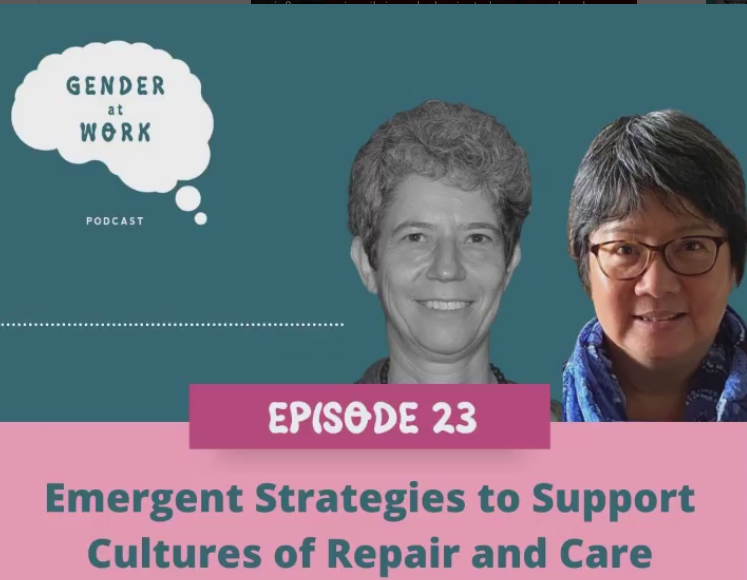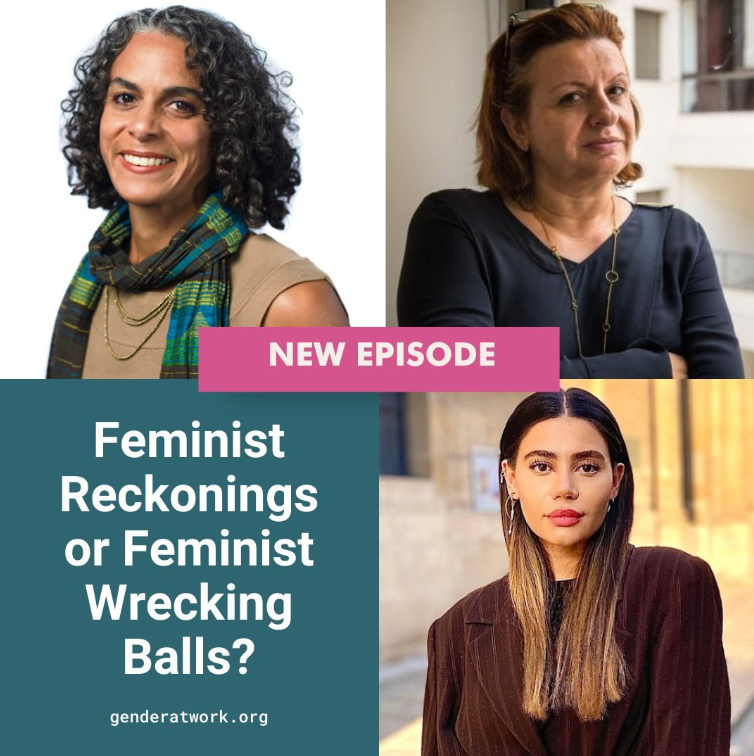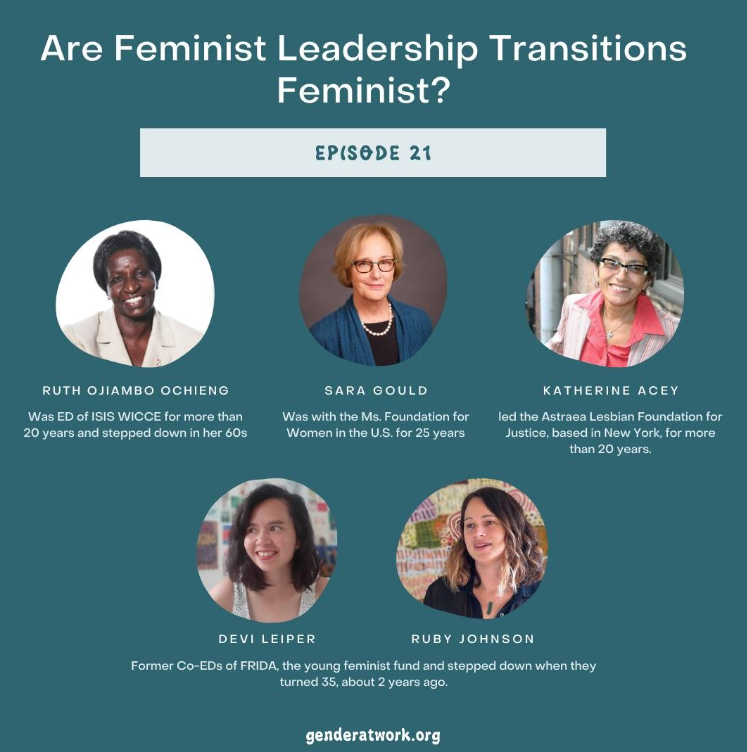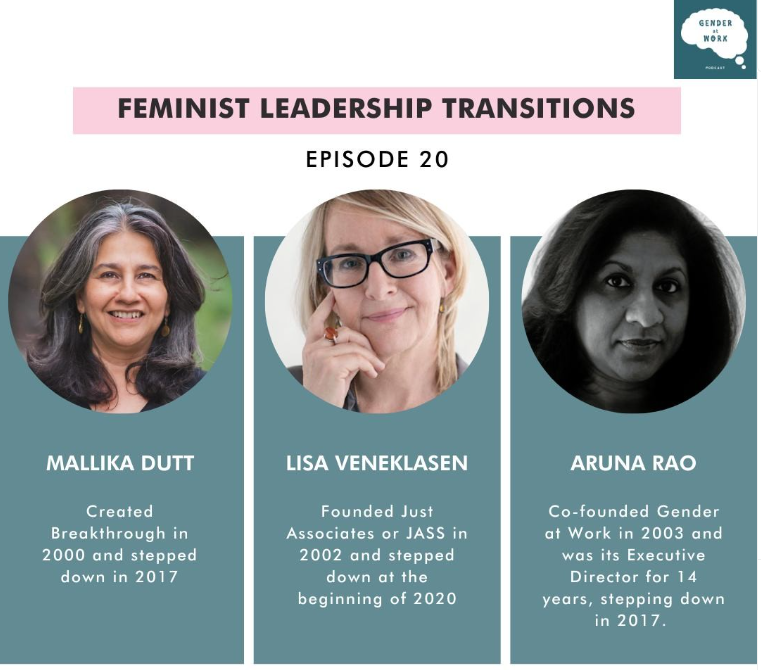Episode 23: Emergent Strategies to Support Cultures of Repair and Care

How do feminist organizations get beyond ‘calling out’ to repair and care? What can we learn from feminist leaders who are experimenting with strategies to build trust, reverse practices that undermine feminist collective action, and prioritize care, connection and thriving?
Episode 22: Feminist Reckonings or Feminist Wrecking Balls?

What is driving the growing numbers of implosions that many social justice groups around the world – including feminist organizations and networks — are experiencing? Coming on the heels of the #MeToo movement, the flashmobs inspired by the “El Violador Eres Tu!” movement, and the Black Lives Matter protests following the murder of George Floyd, we started to witness staff in feminist organizations publicly calling out abuse of power, racism, gender discrimination and other forms of exclusionary practices in the very organizations that we joined to reverse these.
Episode 21: Are Feminist Leadership Transitions Feminist?

We just completed the seminal month for women’s rights globally – worldwide celebration of International Women’s Day on March 8th, innumerable events worldwide for Women’s History month in the United States, and the 66th UN Commission on the Status of Women (CSW) recently concluded. Women’s rights and feminist organizations and movements are the drivers of change for gender equality yet, the question of how feminist organizations grow and thrive, the tensions they experience between principles and how those get practiced, and around how power is exercised are really topics at events like the CSW. In our last episode, we interviewed three founder leaders of feminist organizations and for this episode, we talked with a group of fierce feminist leaders who invested their hearts and souls in four very different organizational contexts over the past 30 years.
Episode 20: Feminist Leadership Transitions

In our last episode we talked about the challenges of dismantling patriarchy and promised that our next episode would start to unpack different strategies to topple patriarchy. We have chosen to focus first on how leadership transitions happen and what happens to the leaders who choose to leave. There is a generational shift in leadership of feminist organizations around the world and we can see that these shifts happen differently in different contexts. They represent a way in which we both wrestle with and challenge patriarchy.
Episode 19: Caring in a Post Covid World
In a passionate and wide-ranging conversation, Kumi Naidoo and Aruna Rao explore hope, fear, Black Lives Matter, feminist principles, intersectionality and structural change. They ask whether the institutions that were set up to protect us, like the police, and to enable social change, such as social services, the UN, and international development organizations, have failed us and whether we should keep trying to change them from the inside or tear them down and start again.
Episode 18: Dismantling Patriarchy – Close Encounters and Imperfect Strategies
Look around you and you’ll find many conversations about reimagining and transforming how we live and work – from how we enable the plant to thrive, to new ways of envisioning economics. And in all kinds of organizations, we are seeing real challenges to what was previously unchecked – abusive power dynamics, toxic work environments, sexual harassment, racism, and discrimination against all kinds of people who don’t fit what was considered ‘the norm’. In this episode – the first in a series of three – Srilatha Batliwala, David Kelleher, Lisa Veneklasen, Joanne Sandler and Aruna Rao reflect on the their close encounters with patriarchy in organizations and the dynamics they tried to ignite to challenge them which they outlined in their article on Medium.
Episode 17: Intergenerational Conversations on Organizing for Gender Equality
On the eve of the Generation Equality Forum (GEF) in Paris, Aruna Rao and Joanne Sandler – veterans of the 1995 Beijing conference – have an intergenerational talk with three young activists: Priya Kvam and Amani Jui from Breakthrough US and Natalia Escruceria Price, an independent consultant formerly with JASS. Our exchange with these young activists highlights …
Episode 16: Are Our Strategies Fit for Purpose?
Gender mainstreaming and the two-track approach to achieve gender equality were two strategies for strengthening organizations’ action on gender equality that grew out of the 1995 Beijing Conference on Women. Twenty-six years later, the world looks very different with multiple crises of inequality, violence against women and LGBTIQ people, climate extinction and less faith in democracy and the old social contract. Have our strategies delivered on their promise?
Episode 15: Can the UN deliver a feminist future?
Can the UN Deliver a feminist future? This question is posed by Anne Marie Goetz (Professor, NYU) and Joanne Sandler (Senior Associate G@W and former Deputy ED, UN Women) in the June edition of Gender and Development. Join us for a lively discussion on this question in the latest episode of the Gender at Work podcast.
Episode 14: Letsema-5 years of changing community norms through dialogue
How do you break up violent ways of behaving and the exercise of power over? How do change what is considered normal? How do you create a new culture that values others no matter how different they are? A community in Gauteng, South Africa, supported by Gender at Work and the Labor Research Service, launched an initiative called Letsema 5 years ago to end gender based violence in their community.
